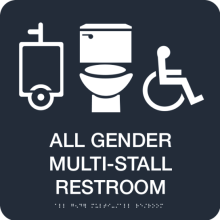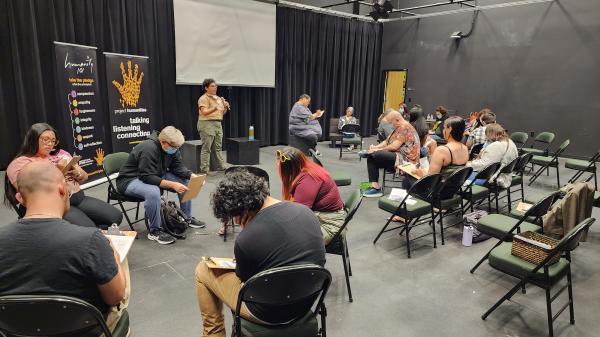Project Humanities recently hosted an interactive workshop on bathroom inclusivity and challenged attendees to consider how they themselves are made uncomfortable or left without essential accommodations. Bathrooms can be an uncomfortable topic for some people to talk about, whether from anxiety, embarrassment, past trauma from having a bad encounter, or having to use a space that was not designed for your body.
Led by ASU Communication Professor Loretta LaMaster and their PhD students, the workshop was premised on the fact that “buildings communicate cultural norms” and that restrooms especially “legislate what is 'normal' and what is not.” At ASU, there are some gender inclusive restrooms and bathrooms that are labeled "Accessible," but these gender inclusive restrooms are not present in every building. This creates hurdles for people who may not identify within a gender binary or even feel comfortable and safe using the bathroom label that they may identify and creates serious detours for a multiday occurrence that everyone experiences, needing to use the restroom.
Essential to this workshop’s success was utilizing Safe Space Guidelines which outlined how to have a productive conversation by equalizing the space we occupied and recognizing humanity in one another. Part of establishing a safe space is respecting confidentiality and understanding that what is shared in confidence within a small group isn’t meant for another person to share with others, especially by sharing personal information like attaching names with what attendees say or said.
I initially attended the event to take notes and not participate in the small groups, but given the guidelines for a safe space, it would have felt disingenuous to observe other people chewing over some difficult questions and being very vulnerable without being willing to offer anything in the small group discussions myself. I was definitely challenged by this workshop because while I knew how bathrooms are not friendly to plus sized people, I myself have never been seriously personally inconvenienced with the way bathrooms are designed or felt excluded because of my gender identity or how I present as a cis woman. Bathrooms are usually a safe space for me, and I did feel some initial panic when asked to reflect on how I have been complacent in making restrooms an exclusive place or failed to support someone when their needs to access a restroom weren't being met. I had never seriously reflected on this before and was initially uncomfortable with addressing that shame within myself, especially because I can remember times in high school when someone had to use a bathroom that didn’t correlate with their gender or were separated from other students in a locker room because they are trans. It is never exciting to recognize that sometimes I can be a part of the problem, but it is an essential step if I am actually invested in making restrooms a more accessible and accepting public space. I know I am more aware of the restrooms that are available in some of my highly frequented study spots and when making plans with a friend, checking to see if a park or cafe has bathrooms that support their gender identity and the existence of their bodies is a new step I am working on making a routine.
Part of the discussion about how we can all work to make bathrooms more inclusive and accessible involves discussing how there are not enough accessible restrooms, and that too often in the US, we see a policing of these spaces to exclude those with invisible disabilities. Even the sign for an "Accessible" bathroom, the stick figure person in a wheelchair, communicates what the kind of person who is using those facilities should look like.
Discussions about bathrooms are important because they can be a matter of physical safety for people. An encounter can result in violence if a self-assigned bathroom policer decides that a person you doesn't match the stick figure sign on the door. This can make bathrooms very traumatic spaces for those forced to use spaces that yield to a male and female binary. It is quite callous if someone, like myself, who has a lot of bathroom privileges, continue to operate within our privilege without making space and protecting the intrinsic right of others to use the bathroom in peace a few times a day without having to agonize over interacting or being perceived as wrong or threatening by others.

